Electronic cigarettes, often marketed as a safer alternative to traditional smoking, are not harmless and pose significant health risks.
Key Harmful Components
E-cigarette aerosol contains a variety of potentially toxic substances:

- Nicotine: A highly addictive substance detrimental to adolescent brain development, cardiovascular health, and fetal development.
- Volatile Organic Compounds (VOCs): Some VOCs released can cause irritation to the eyes, nose, and throat, headaches, and have been linked to organ damage and cancer.
- Flavoring Chemicals: Certain flavorings, such as diacetyl, are associated with serious lung diseases like bronchiolitis obliterans (“popcorn lung”). Many other flavorings have unknown long-term health effects when inhaled.
- Heavy Metals: Metals like nickel, tin, and lead can leach from the heating coil and other components into the aerosol, posing toxicological risks.
- Ultrafine Particles: These particles can be inhaled deep into the lungs, potentially causing inflammation and exacerbating respiratory conditions.
Significant Health Risks
The use of electronic cigarettes is associated with a range of adverse health outcomes:
- Respiratory System Damage: Inhalation of e-cigarette aerosol can cause lung inflammation, airway irritation, and injury, including severe conditions like E-cigarette, or Vaping, product use-Associated Lung Injury (EVALI). It may also increase the risk of chronic bronchitis and worsen asthma.
- Cardiovascular Impact: Nicotine acutely increases heart rate and blood pressure. Chronic use is linked to an increased risk of developing cardiovascular diseases, including heart attacks and strokes.
- Impaired Brain Development: Nicotine exposure during adolescence and young adulthood can disrupt brain development, leading to long-term consequences for attention, learning, mood regulation, and impulse control. It can also increase susceptibility to other forms of addiction.
- Risks During Pregnancy: Nicotine is a known developmental toxicant. E-cigarette use during pregnancy can adversely affect fetal brain and lung development and increase the risk of premature birth and stillbirth.
- Poisoning and Burns: Accidental ingestion of e-liquid, particularly by children, can cause acute nicotine poisoning, which can be fatal. Device malfunctions can also lead to burns and injuries.
- Secondhand Aerosol Exposure: Bystanders can be exposed to harmful substances, including nicotine and fine particulates, from the aerosol exhaled by e-cigarette users.
In summary, despite perceptions, electronic cigarettes are not a benign product. The presence of addictive nicotine and numerous other toxic compounds in their aerosol contributes to significant health risks across multiple organ systems, especially for young people, pregnant individuals, and non-smokers.










